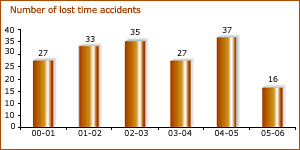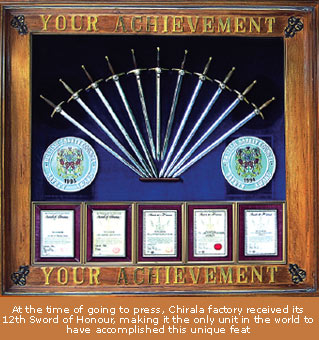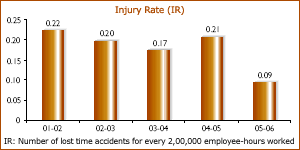Occupational Health & Safety
The Indian Factories Act of 1948 with its numerous amendments, and the Factory Rules in
the States, encompass almost all the requirements of recording and notifying occupational
accidents and diseases in the factories. Indian statutes on this subject are in line with
requirements of the International Labour Organisation (ILO).
EHS Committees
All ITC factories, hotels and large offices have Environment, Occupational Health and
Safety Committees, consisting of an equal number of representatives from unionised
employees and management.
The Central and Departmental EHS Committees help improve employee involvement at all
levels and foster a culture of 'Safety' at the work place. The Unit Head or a very senior
executive heads the Central Committee. Departmental EHS Committees are established in
units with either more than 250 employees or with 'hazardous' operations. The committees,
which meet at least once every three months, discuss EHS issues and review measures taken
to improve EHS performance.
Towards Zero Accident
ITC EHS guidelines go well beyond the provisions of applicable Indian statutes and the
implementation of these guidelines, at every ITC Unit, is audited by the Corporate EHS
Department, at least once a year. In case of any accident or injury, the manager of the
department concerned and the Unit EHS manager document all relevant information -
person(s) involved, time of occurrence, the extent of injury or damage to any property or
environment.
All incidents (accidents without injury, property or environmental damage), accidents
including first aid injuries, serious accidents, dangerous occurrences and fires are
recorded and investigated by trained managers (including the Unit EHS Manager) to identify
the root cause and recommend measures to prevent recurrence. The findings and
recommendations are discussed at the Safety Committee meetings and circulated to all
Departmental Heads/Chiefs to take necessary preventive measures.
All serious accidents are also reported to the Divisional and Corporate Management
Committees.
In any accident where the injured person is unable to resume duty within 48 hours, the
report in the prescribed format is sent to the Inspector of Factories. In case of any
fatal accident, a report is sent to relevant authorities within 12-24 hours of the
accident, as required by the respective State Rules. All ITC units continued efforts to
achieve the Company's 'Zero Accident' goal. ITC units achieved 56 % reduction in 'Lost
Time Accidents' in 2005-06 compared to the previous year (A 'Lost Time Accident' means
that the injured employee has not returned to work the next morning).
This was made possible through the involvement of all employees and service providers
and by implementing sound strategies, comprehensive guidelines and international best
practices. Training and awareness programmes played a critical role as did safety measures
like fully interlocked machine guarding, comprehensive fire safety management systems and
protection measures, first class electrical systems, coupled with audits, proactive risk
management and OHSAS 18001 certified management systems.
 20 units did not have a single lost time accident and did not lose
a single workday due to an accident. These 20 units are: Cigarette
factories at Munger, Saharanpur, Bengaluru & Kolkata; the Research Centers at
Bengaluru & Rajahmundry; Leaf Threshing plant at Anaparti, Packaging & Printing
units at Tiruvottiyur & Munger, the Paperboards unit at Kovai; the Pilot Plant of the
Lifestyle Retailing business at Gurgaon; ITC Welcomgroup Hotels Maurya, Mughal, Chola,
Sonar Bangla, Grand Maratha, Grand Central, Rajputana, WelcomHotel New Delhi and Windsor. 20 units did not have a single lost time accident and did not lose
a single workday due to an accident. These 20 units are: Cigarette
factories at Munger, Saharanpur, Bengaluru & Kolkata; the Research Centers at
Bengaluru & Rajahmundry; Leaf Threshing plant at Anaparti, Packaging & Printing
units at Tiruvottiyur & Munger, the Paperboards unit at Kovai; the Pilot Plant of the
Lifestyle Retailing business at Gurgaon; ITC Welcomgroup Hotels Maurya, Mughal, Chola,
Sonar Bangla, Grand Maratha, Grand Central, Rajputana, WelcomHotel New Delhi and Windsor.
'Lost Time Accidents' in ITC included one fatal accident at the Bhadrachalam
paperboards unit. One of the employees, probably while leaning over a staircase railing in
the coal crushing plant, lost balance and fell from a height. There were no witnesses to
the accident and the body was recovered from the ground floor. All the railings were found
to be in good condition and met the requirements of internationally accepted design codes.
The accident was reported to the requisite regulatory bodies.
| The Sword of Honour, one of the most prestigious International Health and
Safety accolades, is awarded by the British Safety Council. Of the 40 Swords awarded each
year, units outside the UK can win only 10. The winner of this 'Oscar of the Safety
World', apart from maintaining the highest standards, must also have a proven record in
the pursuit of excellence in Health and Safety.  Starting in 1994, ITC's Leaf
Threshing plant at Chirala has won a staggering 11 Swords of Honour. The Chirala unit
shares this ultimate honour with a French multinational engaged in offshore oil
exploration. Starting in 1994, ITC's Leaf
Threshing plant at Chirala has won a staggering 11 Swords of Honour. The Chirala unit
shares this ultimate honour with a French multinational engaged in offshore oil
exploration.
The Chirala plant, located in a small coastal town in Andhra Pradesh, while competing
with the best in the safety world, has tripled its production volumes during the period.
The unit, with a young workforce (50% of the employees are in their early 20s), is
proud of its deep-rooted values inherited from the older generations and the dynamism and
vitality of the younger generation.
This unique recognition for a unit reflects its commitment not only to the highest
levels of Safety and Occupational Health, but to Quality and Social Responsibility as
well. It is not surprising that the unit was the first of its kind in the world to get ISO
14001 Environment Management Systems and SA 8000 Social Accountability certifications,
apart from being certified to ISO 9001, IQRS level 7 and OHSAS 18001. |
 Injury Rate (IR) Injury Rate (IR)
A measure of accidents in a company for every 2,00,000 employee-hours, showed an
improvement of 57% in 2005- 06 over the previous year.
Lost Day Rate (LDR)
LDR is yet another measure of safety performance of a company, signifying the impact of
occupational injuries and diseases. This is reflected in the time off work by the affected
employees and is measured by the number of total days lost due to accidents for every
2,00,000 employee hours.
In 2005-06, the LDR for all ITC units amounted to 6.47 (excluding the fatal accident).
Indian Standards (IS 3786-1983) consider each fatality equivalent to 6,000 man-days lost.
The LDR (including the fatal accident) was 41.29.
|
